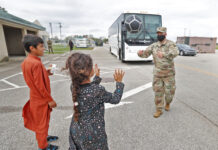CAIRO — Spain’s prime minister was in the Libyan capital of Tripoli on Thursday to reopen his country’s embassy and show support for Libya’s new interim authorities entrusted with leading the nation out of years of civil war.
Premier Pedro Sánchez held talks with his Libyan counterpart, Abdul Hamid Dbeibah, who was elected in February along with a four-member presidential council. That election was part of a U.N.-sanctioned roadmap to take Libya into general elections in December.
Sanchez said was pleased to reopen the embassy after Spain “had spent seven years without representation in a Mediterranean country of such importance.” He added that unlike other European consulates, the Spanish consular team will be authorized to expedite visas on behalf of Libyans to improve mobility between the two Mediterranean countries.
“I hope today’s visit marks a positive turning point and paves the way for more cooperation in this historical juncture that Libya stands at,” Sanchez told reporters at a joint news conference before presiding over the ceremony of the reopening of the Spanish Embassy .
Spain and other Western countries pulled out their diplomatic staff and closed their missions in Libya in 2014, following the escalation of violence between Islamic militias and government forces in Tripoli. Since then, the Spanish diplomatic staff in Libya was operating out of neighboring Tunisia.
Dbeibah welcomed the reopening, saying it shows “how serious Spain is about improving bilateral relations and strengthening its diplomatic presence in Libya.”
“We are looking forward to more positive steps and the lifting of the embargo imposed on Libyan airlines and the easing of issuing (travel) visas for Libyans,” Dbeibah added.
Libya has experienced years of conflict and chaos since a NATO-backed uprising toppled and killed longtime dictator Moammar Gadhafi in 2011. In recent years, oil-rich Libya has been split between a U.N.-supported government in Tripoli and rival authorities based in the country’s east, each backed by armed groups and foreign governments.
But an October cease-fire has stopped most of the violence and stipulated that all foreign mercenaries should leave.
Since the election of Libya’s new interim government in February, a series of senior European and American diplomats have visited the North African country, to express support for the new Libyan administration. France and Greece preceded Spain in reopening their embassies.
“It is time for peace, it is time for the Libyan people to have what they have deservedly been desiring during these recent years: security, wellbeing and prosperity,” said Sanchez.
Both Spanish and Libyan premiers said they had signed several memorandums of understanding to boost economic cooperation in various sectors such as health, infrastructure, agriculture, education, livestock and renewable energy.
“We also want to engage in this phase of economic transformation in Libya,” said Sanchez, who was accompanied by a group of Spanish businessmen keen on exploring business opportunities in Libya.
Associated Press writer Joseph Wilson in Madrid contributed to this report



